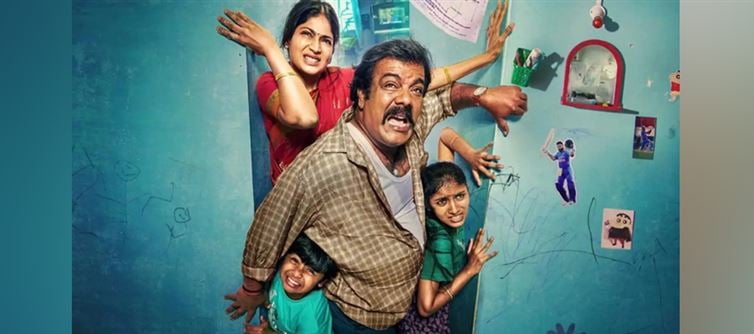
Middle Class Review: A Relatable Ride That Misses the Spark but Still Lands Soft
Middle Class is built on a premise so simple and so familiar that it almost feels like folklore: a struggling man stumbles upon life-changing money, loses it, and must reclaim it before everything collapses. kishore Muthuramalingam’s film leans heavily on this relatability, crafting a grounded, competent narrative anchored by Munishkanth’s understated charm. It’s watchable, occasionally warm, intermittently funny — but also frustratingly formulaic. For a story brimming with emotional stakes and comedic potential, Middle Class often plays things too safe, too predictable, too… middle-of-the-road.
STORY
At the heart of the film is Marx (Munishkanth), a man whose very name — gifted by his politically charged father — sets the tone for his life: ideological baggage, everyday struggle, and eternal compromise. The plot kicks off when Marx discovers a forgotten land document revealing that his late father once helped a Rajasthani businessman who has now left him a blank cheque worth ₹1 crore as a token of gratitude. It’s the kind of miracle that could flip a middle-class household upside down.
Except Marx promptly loses the cheque.
What follows is a frantic hunt across neighborhoods, memories, and misadventures as Marx, his perpetually stressed wife, and two loyal buddies attempt to retrieve the life-saving piece of paper before it expires or ends up in the wrong hands. The premise is loaded with energy, but the execution rarely deviates from the predictable template of domestic melodrama, manufactured friction, and routine middle-class panic. While the film’s structure is disciplined, the situations themselves feel familiar to a fault.
PERFORMANCES
Munishkanth is the film’s spine and soul. His performance is restrained, refreshingly unexaggerated, and deeply human. He plays Marx not as a caricature but as a man weighed down by life, yet never fully defeated by it. The subtlety works, especially in moments where panic and absurdity collide.
Vijayalakshmi complements him adequately, although the script confines her to the one-note “nagging spouse” stereotype. Despite her capability, she’s rarely allowed moments of nuance beyond frustration and volume.
Radharavi makes a late entry, but his presence injects the narrative with wit and sharpness at precisely the point where the pace risks stagnation. His seasoned timing elevates entire sequences. kaali venkat and Kuraishi deliver reliable, engaging contributions, especially in the second half, adding both texture and comic buoyancy.
TECHNICALITIES
The film’s strongest asset is its technical discipline. The editing is taut, ensuring the screenplay maintains momentum without indulging in unnecessary detours. The absence of mandatory song interruptions allows the narrative to breathe naturally.
The cinematography opts for realism over flourish, capturing the cramped homes, crowded streets, and lived-in spaces of middle-class life with authenticity. The background score is particularly interesting — it frequently introduces comedic cues even during serious moments, creating a tonal duality that both softens and enhances the tension.
ANALYSIS
Middle Class succeeds most in its sincerity. It understands the pulse of financial anxiety, the fragility of relationships under pressure, and the small humiliations of everyday living. The screenplay respects these truths and doesn’t sensationalize them.
Yet, this sincerity is held back by a lack of dramatic invention. Scenes feel too familiar, too safe, as if stamped from a generic template for family dramas. Emotional beats arrive exactly when predicted. Conflicts unfold with mechanical precision. Even the central mystery — the missing cheque — follows a straightforward path that never truly surprises.
Still, between Munishkanth’s grounded performance, the clean writing, and moments of genuine humor, the film remains comfortably watchable. It may not soar, but it never sinks.
WHAT WORKS
• Munishkanth’s restrained, heartfelt performance
• Taut editing and a disciplined screenplay
• Authentic portrayal of middle-class anxieties
• Well-timed humor from supporting characters
• Radharavi’s lively second-half presence
• Realistic cinematography and well-balanced tone
WHAT DOESN’T
• Predictable, template-driven scenes• One-note characterization of the wife
• A central mystery that never becomes compelling
• Safe storytelling that avoids risk or novelty
• Lack of emotional or comedic layering




 click and follow Indiaherald WhatsApp channel
click and follow Indiaherald WhatsApp channel